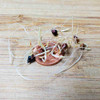Description
Broom Corn
A tall annual grass that looks like a corn plant but makes fan-shaped seed heads instead of ears. The seeds mature in the autumn in a multitude of colors, shades of red, black, amber and brown. Easy to grow in full sun.
Uses
The edible seeds can be sprouted, cooked, popped, or ground into flour. The straw can be made into brooms or tie untrimmed tassels into bundles to feed birds through winter. Ideal for kids, crafts and critters.
Learn More
From the soil to the seed to the food you eat - we'll help you grow your best garden!
2 Reviews
-
Neat plant. Put it in our Botanical Herb Garden's Fiber Plant bed in the Herb Gardens
Multi-colored stalks 12' high.I've made a broom from these many years ago.
-
Table decorations for a fall harvest event
Directly planted on May 28, plants grew to about 10 feet and were trouble-free. In the first week of September, we were impacted by hurricane Dorian which, while not severe here did cause the knockdown of most of the stalks but did not uproot them. The broom heads were cut off the third week of Oct and later used as table decorations for a fall harvest event for the public sponsored by the Land House staff. It is our intent to grow sorghum every year in a demonstration plot. Colonists grew it for grain, made brooms and also with certain varieties produced sorghum sugar they used as a sweetener. In addition, sorghum is increasingly grown in Virginia as a commercial crop.





















